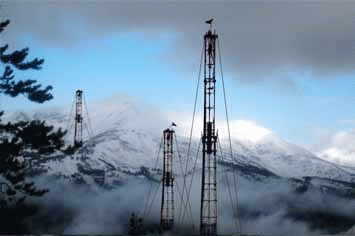More fracking of the Rockies by jdial, photo credit
The Environmental Defense Fund, of which speaker Dan
Grossman[1] is regional director, would reconcile climate and energy
issues. EDF, you may have heard, is one
of the world's established Big
Green environmental groups. There is
more to that story.[2]
In pursuit of that union between climate and energy, EDF placed
all its eggs in the basket of cap and trade.
As we all know at one point it had been close to coming to pass, but close
nets us no cigar. When the cap-and-trade
basket broke, EDF whisked its eggs into natural gas. Perceiving prospect amidst peril, EDF is
attempting to partner with the industry to "do things right", like the wife of
a rampaging husband who, on days he doesn't hit her, assures herself he's
starting to respect her.
Proponents and partners of natural gas tout its cleaner
combustion, and it is indeed the case that with gas (but not oil) combustion,
we are seeing lower levels of air pollution--as long as we restrict our view to
the burning. Carbon-dioxide emissions from
burning coal total 2,200 pounds per megawatt hour while those from burning natural
gas total a relatively paltry 950 pounds per MW.h. But
power-plant emissions are hardly the whole story. A truer picture of energy effects requires including
the entire production cycle. In the case
of coal it is relatively simple. Coal is
mined and processed, transported, and burned--three simple steps if we ignore
the impacts of detonating any mountains in our way. Natural gas, on the other hand, once
extracted, must be processed to remove impurities, transmitted along pipelines
or in trucks, stored, and locally distributed before it can be burned--a five-step
process that, once again, overlooks the minutia of drilling.
EDF has chosen to partner with the oil-and-gas industry "to
do things right". Can fracking be our
friend?
Fracking, says Grossman, equals energy security. How often those seductive words do susurrate. Energy security will make
us safe from scheming furriners. Energy
security will protect our unsustainable lifestyle. Energy security will restore us to our proper
place in the eyes of an envious world.
Of course, energy security refers exclusively to newfound (or newly
accessible) fossil fuels.
In a talking
point lifted right out of the industry's litany, Grossman said that hydraulic
fracturing has been around for a long time.
Except it hasn't--horizontal slickwater fracking had its first success in
1998,
transforming the industry and introducing a technology that is still being "perfected". Perhaps to believe that fracking has been
around a long time assuages doubts about how well tested is the technology and how
innocuous its tailings.
Undoubtedly fracking is providing an economic bonanza to
those areas perched fortuitously or not, depending on perspective, atop the
right sort of shale. This bonanza of gas
and of oil, which, oh hallelujah, can be fracked as well, is increasing the
energy security of this country. We don't
import so many foreign fossil fuels and may even be in a position to distribute
our own, or our technology, to the rest of the world. When that happens, be warned: Any who endeavor to spurn our largesse may
bump up hard against the Trans-Pacific
Partnership. Let them burn gas.
Now that fracking is for oil as well as gas, we
have a new manifestation of an old problem.
Gas is often associated
with oil in oil fields or even in coal beds where it is known as coal-bed
methane. (When gas like Cinderella is
the sole hydrocarbon in the realm it is "non-associated".) When a driller is looking for oil and comes
across unbidden gas, he can't patch it through another pipe because facilities
for the two fuels diverge. So he lets it
go. You've seen them in Texas and now
North Dakota--flame-spouting apertures through which unwanted natural gas is
being flared. Vastly worse for the planet
since methane is so a potent a hothouse gas is the practice of simply venting
surplus gas to air. Both customs
were common throughout the last century and are still in practice
now, with the emphasis nominally on flaring.
There may be less air pollution when gas is burned, but occasions
abound for water most foul. Contamination
of water, be it ground- or surface, Grossman tells us, occurs more frequently
from spills than from drilling.[3] Whichever
the culprit, results are the same--contaminated water. Water uncontaminated is in great demand for
fracking, and at this time most water used to frack is useless ever after. Any water diverted in the semi-arid, full
allocated West will be subtracted from some other purpose.
In the midst of the gas rush lurks the obstinate problem of methane
leaks.[4] For Grossman and the EDF,
the solution is simply to reduce those leaks. Easier said than done; on the path
from shale to stove, invisible defects are rife. And estimates of the extent of leakage diverge. Still working on that marriage, EDF is teamed
with industry to pinpoint that percentage.
The question is how to fix it.
What is euphemistically called "cumulative impacts"--noise, pounding, lights, and trucks the livelong day--primarily affect local residents. Their pain contributes to a certain lack of
public trust. When Dick Cheney
engineered the release of the oil-and-gas industry from clean-water oversight
it raised a few eyebrows; maintaining strict secrecy over constituents of
fracking fluid has not encouraged their descent.
We've covered pros and cons of natural gas, which is now or soon
will be available throughout the world in abundance, thanks to hydraulic fracturing lavishly applied. Cons may
predominate but the scale still tilts in the direction of drilling. The thumb on the scale is the prospect of
short-term profit.
Investment-wise, says Grossman, renewable energies are just
not viable. The prospect of cheap and
plentiful natural gas eradicates any sputtering impulse toward developing
renewables. The only real fix to our
dilemma is to put a price on carbon--a price that is commensurate with what
using it is costing the planet. As to
doing that we're not even close.
Seems like EDF is in a dysfunctional relationship, and too many people are thinking with their drills.
This article emerged
from the eighth of nine planned lectures held by the Center of the American
West, CU Continuing Education, Boulder County, and the AirWaterGas Research
Network (of the National Science Foundation/Sustainability Research Network) on
various aspects of hydraulic fracturing.
(Note: You can view every article as one long page if you sign up as an Advocate Member, or higher).






